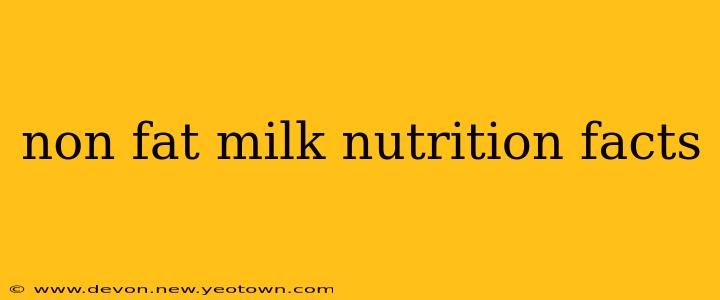Let's be honest, the term "nonfat milk" might conjure up images of watery, flavorless beverages. But the truth is far from that! Nonfat milk, also known as skim milk, is a nutritional powerhouse packed with essential vitamins, minerals, and protein, all without the fat. This creamy, versatile drink has been a staple in many diets for its incredible health benefits. In this deep dive, we'll explore the nutritional profile of nonfat milk, address common questions, and uncover why it deserves a spot in your daily routine.
What are the nutritional benefits of nonfat milk?
Nonfat milk boasts an impressive nutritional profile. Imagine a beverage that's low in calories but high in essential nutrients – that’s precisely what nonfat milk offers. It's an excellent source of calcium, crucial for strong bones and teeth, and provides a significant amount of protein, essential for building and repairing tissues. Beyond that, it's a good source of vitamin D, vital for calcium absorption, and riboflavin (vitamin B2), important for energy metabolism.
How many calories are in nonfat milk?
One cup (240ml) of nonfat milk typically contains around 80-90 calories. This significantly lower calorie count compared to whole milk makes it a popular choice for those watching their weight. This calorie reduction doesn't compromise its nutritional value; it simply removes the fat content.
Is nonfat milk good for weight loss?
Yes, many find nonfat milk a valuable asset in their weight loss journey. Its lower calorie count compared to whole milk, coupled with its satiating protein content, can aid in managing hunger and promoting weight loss. The protein helps keep you feeling fuller for longer, preventing those mid-afternoon cravings that can derail your diet. However, remember that weight loss is a multifaceted process involving diet and exercise.
What are the differences between nonfat milk, low-fat milk, and whole milk?
The primary difference lies in the fat content. Whole milk retains all its natural fat, resulting in a richer, creamier taste and higher calorie count. Low-fat milk, also known as 1% milk, removes some of the fat, providing a balance between taste and calorie reduction. Nonfat milk, or skim milk, removes almost all of the fat, resulting in the lowest calorie count and leanest option. The choice depends on your individual preferences and dietary needs.
Does nonfat milk contain any fat?
While labeled "nonfat," it's crucial to understand that a tiny amount of fat might remain. The process of removing fat is highly efficient, but trace amounts can persist. However, this trace amount is negligible compared to the fat content in low-fat or whole milk.
What are the potential drawbacks of drinking nonfat milk?
While generally safe and healthy, some might find nonfat milk less satisfying than its higher-fat counterparts. The absence of fat can impact the taste and creaminess, leading some to prefer low-fat or whole milk. Also, ensure you choose fortified nonfat milk, as some nutrients might be lost in the fat removal process. Look for options enriched with vitamins A and D.
Is nonfat milk suitable for children?
Fortified nonfat milk can be a part of a healthy diet for children, providing essential nutrients for growth and development. However, always consult a pediatrician or registered dietitian before making significant changes to a child’s diet, especially for those with specific dietary needs or allergies.
What are some delicious ways to incorporate nonfat milk into my diet?
Nonfat milk's versatility shines through its diverse applications. It’s perfect in cereal, smoothies, coffee, and baking. You can also use it in recipes that call for milk, enjoying the health benefits without sacrificing taste. Experiment with different recipes to discover new and exciting ways to enjoy this nutritional powerhouse.
In conclusion, nonfat milk is a versatile and nutritious beverage that deserves a prominent place in a balanced diet. Its low-calorie content, coupled with its impressive array of vitamins and minerals, makes it a healthy choice for individuals of all ages and dietary goals. While individual preferences might vary, the nutritional benefits of nonfat milk cannot be denied. Remember to choose fortified options and consult with a healthcare professional if you have any specific dietary concerns.

